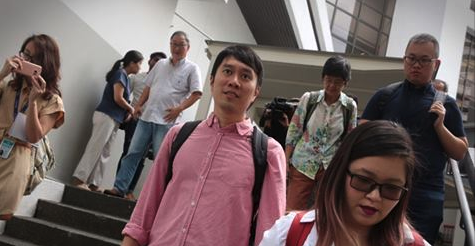-
Advocacy Theme
-
Tags
- Abortion
- Adoption
- Caregiving
- CEDAW
- Disability
- Domestic Violence
- Domestic Workers
- Harassment
- Healthcare
- Housing
- International/Regional Work
- Maintenance
- Media
- Migrant Spouses
- Migrant Workers
- Muslim Law
- National budget
- Parental Leave
- Parenthood
- Polygamy
- Population
- Race and religion
- Sexual Violence
- Sexuality Education
- Single Parents
- Social Support
- Sterilisation
- Women's Charter
AWARE’s statement on charges against civil society activist
November 30th, 2017 | News, Views

Photo: Jason Quah/TODAY
AWARE is concerned to hear that charges have been brought against Jolovan Wham, a social worker and civil society activist with a long track record of good work for marginalised people, especially women migrant domestic workers.
This case raises important questions about whether the laws and regulations on assembly in Singapore are too restrictive. Our own experience of organising events at Hong Lim and elsewhere is that seeking a permit can be cumbersome and uncertain. Sometimes we have not been informed of the outcome of the application until the day just before, which makes publicity and logistics – especially for foreign speakers – difficult.
It is important to make space for diverse voices in our society. When the conditions for speaking up about social and political issues are restrictive and carry potential criminal liability, this can have an intimidating effect on the public and discourage people from expressing their views.
Some regulation of public assembly may be necessary to safeguard the public interest in safety and prevent disruption. Yet it may be timely to reconsider how restrictive these regulations should be. Events that do not threaten the safety and well-being of any person, damage any property or cause disruption to ordinary affairs should not be made difficult to organise, and it is doubtful whether society’s interests are best served by making them liable to criminal prosecution.
Singapore’s laws on assembly and indoor talks, in particular, may criminalise a broad range of harmless activities.
One charge facing Wham concerns a talk where a speaker Skyped in from Hong Kong. As we understand it, according to the law, a talk to “publicise a cause or campaign, or to mark or commemorate any event” does not require a police permit – as long as all speakers and organisers are citizens, and the talk does not relate to religion or cause racial emnity.
But in a country as international as Singapore, how realistic is it to require prior permits for all discussion of social issues, where a foreigner might be somewhat involved?
AWARE did not, for example, obtain a police permit to host a March talk by sexual assault survivor Claire MacFarlane, who was also featured on Singapore radio and in the newspapers. Should such an event really require a police permit? Or is it time for the law to catch up with society – where foreigners are constantly heard, for instance, on the television or as teachers in educational institutions, with no apparent ill effect?
Moreover, in a country where 1 in 3 citizen marriages is to a foreigner and 1 in 5 children has a foreign parent, should it be so hard for members of our society to be heard? If foreigners work in sectors that have social implications for Singapore, and are experts in a particular field, is it better to welcome their expertise, or make it harder to hear from them? Foreigners are also often valued volunteers or staff of organisations who wish to contribute positively to the society they live in by helping with events organisation. It is unhelpful and unrealistic to expect all organisers to go through the onerous – and often, unclear – process of permit application for every event, simply because a non-Singaporean is involved. It is time to rethink these rules.



